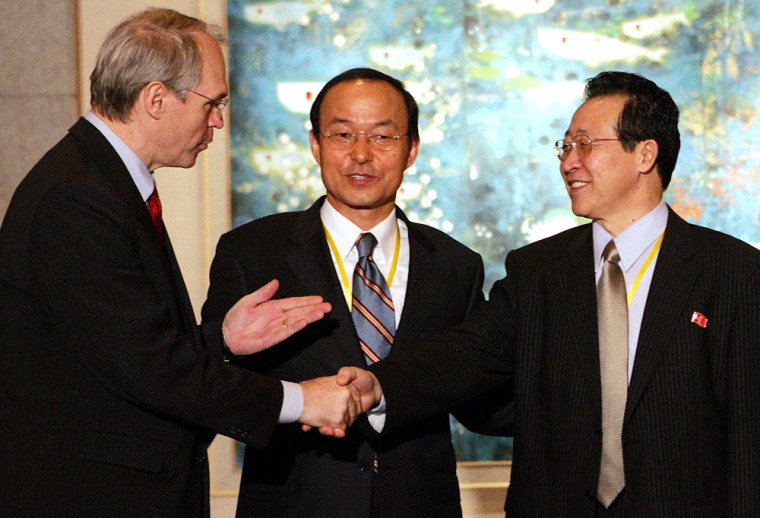North Korea said Tuesday it would not dismantle its nuclear weapons program until the United States first provides an atomic energy reactor, casting doubt on its commitment to a breakthrough agreement reached at international arms talks.
According to a joint statement issued at the talks’ conclusion Monday, the North “committed to abandoning all nuclear weapons and existing nuclear programs and returning at an early date” to the Nuclear Nonproliferation Treaty and International Atomic Energy Agency safeguards.
The North insisted during arms talks that began last week in Beijing that it be given a light-water reactor, a type less easily diverted for weapons use, in exchange for abandoning nuclear weapons. The agreement reached Monday — the first since the negotiations began in August 2003 — says the six countries in the negotiations will discuss the reactor issue “at an appropriate time.”
The U.S. State Department said the North’s views, set out in a long statement Tuesday, did not match the signed agreement.
China asked all sides to fulfil their promises. Seoul said it would take the lead role in bridging the gap between the U.S. and North Korean views. Japan saw a possible negotiating ploy.
“We must watch North Korea closely to see if there is really a fundamental difference on that point,” Japanese Chief Cabinet spokesman Hiroyuki Hosoda told reporters. “If we are completely at odds, that will mean going back to the beginning. But we do not believe that is the case.”
The six countries, also including Russia, had agreed on Monday to a set of principles on winding up Pyongyang’s nuclear programs in return for aid and recognition of its right to a civilian nuclear program.
Deal not yet dead
Analysts noted that the North had backtracked on seemingly rock-solid positions before, and so the deal was not yet dead.
“They’ve chosen the appropriate time to discuss it as now,” said Peter Hayes, a North Korea expert at the Royal Melbourne Institute of Technology. “I think what they’re doing is negotiating. They’re putting out a maximal position.”
The North’s Foreign Ministry statement could be mostly aimed at its own people, said Toshimitsu Shigemura, a professor at Waseda University in Tokyo and an expert on North Korea.
While official reaction to the end of the fourth round of talks had been upbeat, skeptics had already said the deal was long on words, vague on timing and sequence, and short on action.
The North’s comments exposed those shortcomings.
“The U.S. should not even dream of the issue of the DPRK’s dismantlement of its nuclear deterrent before providing LWRs,” said the statement, published by the KCNA news agency. “This is our just and consistent stand as solid as a deeply rooted rock.”
DPRK is short for the North’s official name, the Democratic People’s Republic of Korea. LWRs are light-water reactors that experts say are more proliferation-resistant than others.
Bluster or bombshell?
As the North has given ground before, its statement may not be the last word. After the first round in August 2003, it said just a day after the talks it saw no need for more.
“It could be a lot of bluster,” said one U.S. official in Washington. But Tuesday’s statement posed at least a challenge to a deal which delegates had applauded less than 24 hours earlier.
“This was obviously not the agreement they signed and we will see what the coming weeks bring,” said State Department spokesman Sean McCormack, referring to the gap before talks are set to resume in November. Japan took the same view.
Referring to its nuclear deterrent, North Korea’s chief delegate, Vice Foreign Minister Kim Kye-gwan, told reporters in Beijing: “There will be no such thing as giving it up first.”
Back in Pyongyang, he said he hoped the North and Washington could take real action on the Beijing agreement.
South Korea optimistic
Seoul said the North’s overall comments were no surprise.
“North Korea and the United States may pull and push over the wording of ’appropriate time’ but the South Korean government’s role is to mediate,” President Roh Moo-hyun’s spokesman quoted him as saying. Roh said the deal should open the gates to more economic aid to the impoverished North.
South Korea’s stock market was optimistic, too. It ended on an all-time high, despite the apparent setback.
“North Korea’s willingness to compromise at the negotiation table is still a very good sign for the market,” said Kim Hyun-tae, a fund manager at Landmark Investment Management.
The United States, backed by Japan, had long argued that North Korea could not be trusted with atomic energy because it had broken a previous deal to halt weapons development.
But China, South Korea and Russia said that if Pyongyang scrapped its nuclear weapons and agreed to strict safeguards, it should have such an energy program in the future.
